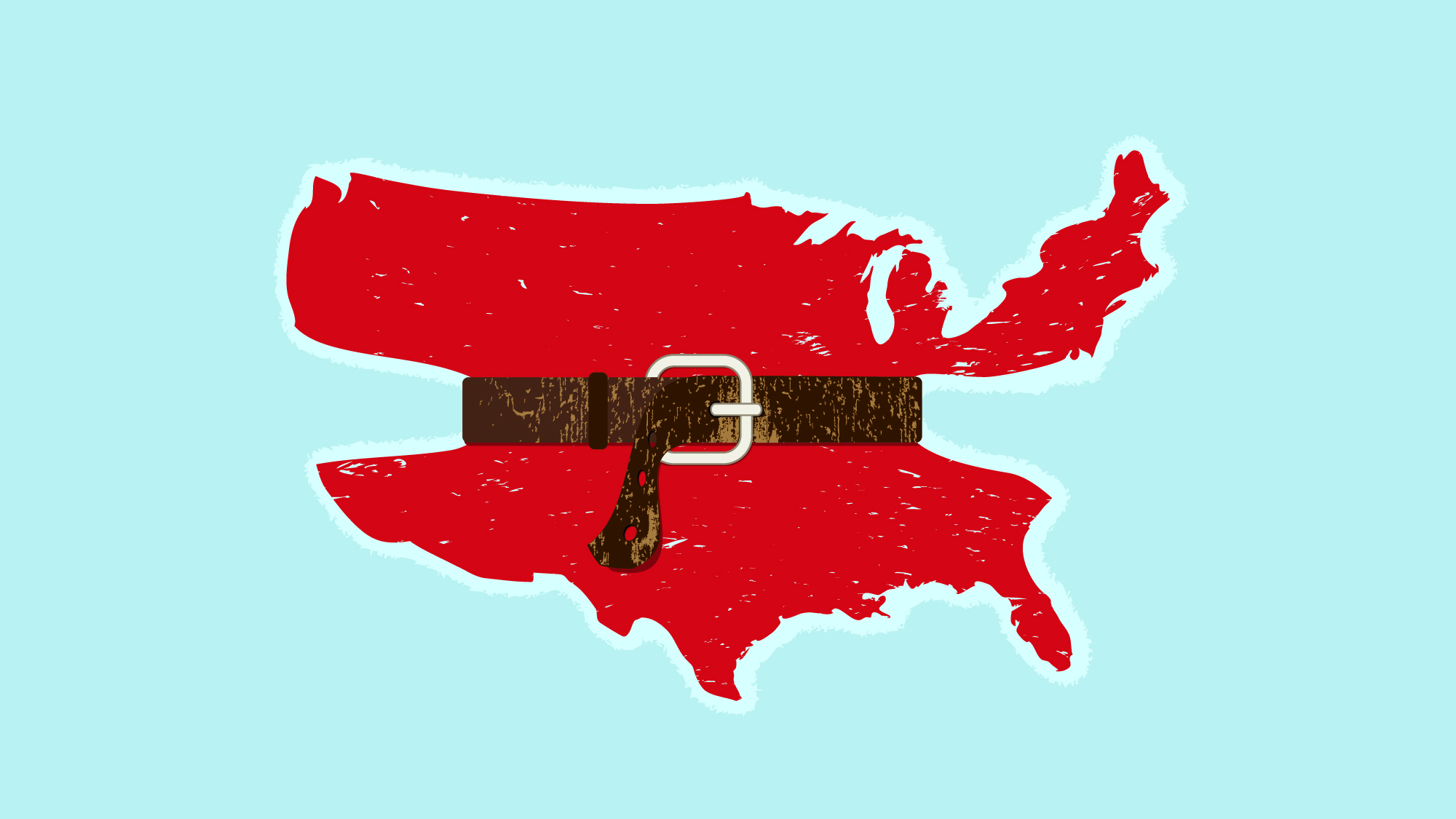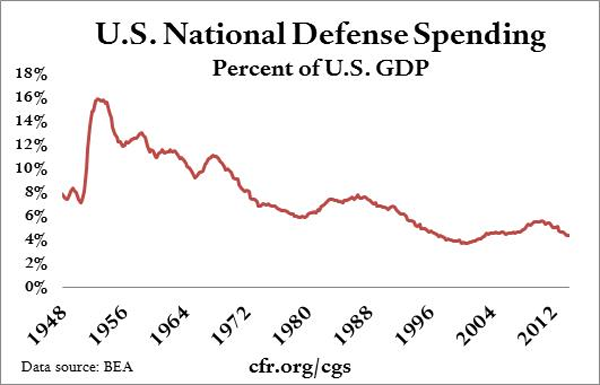The deficit is shrinking — but it's still a huge problem
We are spending way, way too much money


A free daily email with the biggest news stories of the day – and the best features from TheWeek.com
You are now subscribed
Your newsletter sign-up was successful
Let's start with some good news: That monster deficit we faced back in 2009 — all $1.4 trillion of it — has been slashed big time over the past several years. The annual budget shortfall is still $483 billion, but stacked up against the $18 trillion U.S. economy, this deficit is in line with the average-sized deficit going back 50 years.
As usual, when the news is good, both Republicans and Democrats bicker over who gets credit for it. Democrats, led by President Obama, say the deficit is down because they've spurred the economy to grow again, generating tax revenue. Republicans counter that the deficit is down because they've held the line on spending. There's probably some truth in both of these positions.
But of course, there's bad news on the deficit that neither party seems ready to acknowledge, let alone claim credit for. That $483 billion deficit? That's about as good as it's going to get. It's like that first steep drop on a roller coaster. The deficit has fallen, and fallen fast — but it's about to head right back up again. The nonpartisan Congressional Budget Office says the deficit will bottom out in 2017 — just as Obama leaves office — and then return to trillion-dollar territory by 2025. The national debt — in nominal terms — will jump to $21 trillion, the CBO adds.
The Week
Escape your echo chamber. Get the facts behind the news, plus analysis from multiple perspectives.

Sign up for The Week's Free Newsletters
From our morning news briefing to a weekly Good News Newsletter, get the best of The Week delivered directly to your inbox.
From our morning news briefing to a weekly Good News Newsletter, get the best of The Week delivered directly to your inbox.
What's driving the forecasted spike in future deficits? It's the stuff no one in Washington has the guts to touch: entitlements. In 2014, the big three — Medicare, Medicaid, and Social Security — gobbled up 57 percent of the federal budget. And 10,000 baby boomers (born between 1946 and 1964) are retiring every single day, and tapping into these benefits. Life expectancies are rising as well, so there are more people retiring than dying. (Not like we should be rooting for death! But from a budgetary perspective, if more people get added to entitlement rosters than are removed from them, the costs balloon fast.) The result is that entitlement spending — already enormous — is about to explode.
Liberals like to blame defense spending for our red ink — but, as this chart provided by the Council on Foreign Relations shows, military spending, as a percentage of the economy, is actually quite low, and in line with where it has been for decades. Entitlements are the real source of our deficit problem.

To make things worse, as the economy improves, interest rates will move up — meaning it will cost us more to pay back our debts. Interest on the debt — $271 billion last year, even with record-low interest rates — will jump. The next president had better buckle his (or her) seat belt, because the next decade is going to be rough. Nasty spending cuts, higher taxes: Soaking up all that red ink is going to be painful — and you and I are going to pay the price.
There are two ways of avoiding this mess. One is quite painful: We can cut entitlements by raising eligibility ages and/or slashing benefits. Everybody sacrifices. But what lawmaker is going to make grandma — or you — give something up? That's not how politicians roll; it's certainly not how they get re-elected.
A free daily email with the biggest news stories of the day – and the best features from TheWeek.com
The other option is to grow the economy at a rate that exceeds the growth of entitlements — but history suggests this is unlikely. We're simply not growing fast enough to outpace the deteriorating demographics. When Social Security began, for example, there were 42 workers for every retiree. As of 2012 there were 2.8, and by 2035 there will be 1.9, the CBO projects.
Neither the president nor GOP leaders in Congress have uttered a word about tackling this mother-of-all-problems lately. In his State of the Union, there wasn't a peep from Obama, and his aides talk (off the record as always) about "ending mindless austerity." But there hasn't been a word from John Boehner or Mitch McConnell, either. Their priorities are a pipeline, overturning healthcare, and — talk about fiscal irresponsibility — more tax breaks for the wealthy. Obama's a big-spending liberal, we get it. But in a way, Republicans are even worse: They preach austerity while pushing deficit-busting tax breaks for their rich friends — while ignoring the coming storm.
An award-winning member of the White House press corps, Paul Brandus founded WestWingReports.com (@WestWingReport) and provides reports for media outlets around the United States and overseas. His career spans network television, Wall Street, and several years as a foreign correspondent based in Moscow, where he covered the collapse of the Soviet Union for NBC Radio and the award-winning business and economics program Marketplace. He has traveled to 53 countries on five continents and has reported from, among other places, Iraq, Chechnya, China, and Guantanamo Bay, Cuba.
-
 Bad Bunny’s Super Bowl: A win for unity
Bad Bunny’s Super Bowl: A win for unityFeature The global superstar's halftime show was a celebration for everyone to enjoy
-
 Book reviews: ‘Bonfire of the Murdochs’ and ‘The Typewriter and the Guillotine’
Book reviews: ‘Bonfire of the Murdochs’ and ‘The Typewriter and the Guillotine’Feature New insights into the Murdoch family’s turmoil and a renowned journalist’s time in pre-World War II Paris
-
 Witkoff and Kushner tackle Ukraine, Iran in Geneva
Witkoff and Kushner tackle Ukraine, Iran in GenevaSpeed Read Steve Witkoff and Jared Kushner held negotiations aimed at securing a nuclear deal with Iran and an end to Russia’s war in Ukraine
-
 The billionaires’ wealth tax: a catastrophe for California?
The billionaires’ wealth tax: a catastrophe for California?Talking Point Peter Thiel and Larry Page preparing to change state residency
-
 Bari Weiss’ ‘60 Minutes’ scandal is about more than one report
Bari Weiss’ ‘60 Minutes’ scandal is about more than one reportIN THE SPOTLIGHT By blocking an approved segment on a controversial prison holding US deportees in El Salvador, the editor-in-chief of CBS News has become the main story
-
 Has Zohran Mamdani shown the Democrats how to win again?
Has Zohran Mamdani shown the Democrats how to win again?Today’s Big Question New York City mayoral election touted as victory for left-wing populists but moderate centrist wins elsewhere present more complex path for Democratic Party
-
 Millions turn out for anti-Trump ‘No Kings’ rallies
Millions turn out for anti-Trump ‘No Kings’ ralliesSpeed Read An estimated 7 million people participated, 2 million more than at the first ‘No Kings’ protest in June
-
 Ghislaine Maxwell: angling for a Trump pardon
Ghislaine Maxwell: angling for a Trump pardonTalking Point Convicted sex trafficker's testimony could shed new light on president's links to Jeffrey Epstein
-
 The last words and final moments of 40 presidents
The last words and final moments of 40 presidentsThe Explainer Some are eloquent quotes worthy of the holders of the highest office in the nation, and others... aren't
-
 The JFK files: the truth at last?
The JFK files: the truth at last?In The Spotlight More than 64,000 previously classified documents relating the 1963 assassination of John F. Kennedy have been released by the Trump administration
-
 'Seriously, not literally': how should the world take Donald Trump?
'Seriously, not literally': how should the world take Donald Trump?Today's big question White House rhetoric and reality look likely to become increasingly blurred
